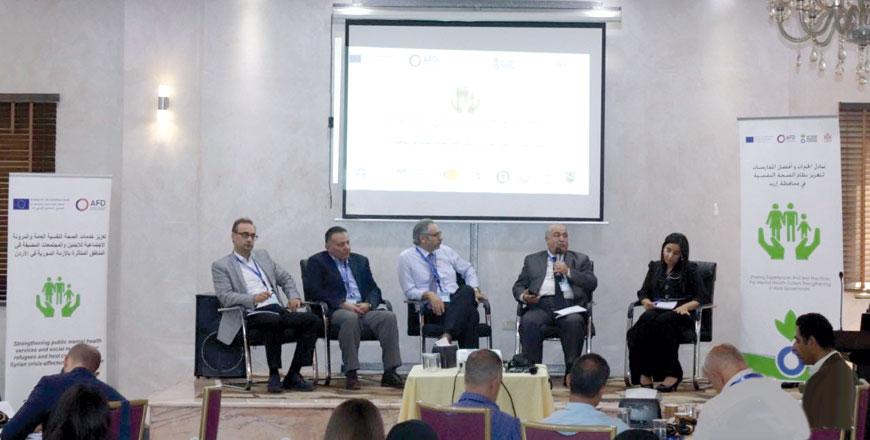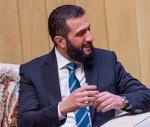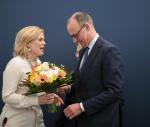You are here
Aid agency to open mental health clinics for refugees in southern districts
By Tom James - Nov 26,2014 - Last updated at Nov 26,2014
AMMAN — A major aid agency will open five mental health clinics in the Kingdom's south next week, as part of a broader effort to reach refugees suffering from war trauma.
International Medical Corps, one of the largest Western aid agencies working in Jordan, will open clinics in Tafileh, Maan and Karak governorates in cooperation with the Ministry of Health and the Jordanian Hashemite Fund for Human Development. The clinics, slated to open December 1, will target the most traumatised refugees from the wars in Iraq and Syria, agency officials said this week.
"There is a lot of work to be done," said Ahmad Bawaneh, the aid group's director of mental health programmes in Jordan, who called the clinics the first step towards providing mental healthcare to refugees in the south.
"For sure this will not be enough," the doctor said. "But it will be better to respond to the most severe and most vulnerable cases" than to none.
While the facilities will officially open on December 1, the clinics in Tafileh and Maan have already begun seeing a few patients, said Omar Asfur, the project manager overseeing the opening of the clinics.
Of the centres, two will be specialised care programmes in Karak and Maan dedicated to treating the most seriously affected among the refugee population who need intensive therapy and sometimes medication, Asfur said. The remaining three, in the same cities and also in Tafileh, will be separate support centres providing mostly group therapy and classes with the ability to refer patients for individual counselling or therapy to the other facilities as needed.
All five of the clinics are housed in existing buildings operated by other organisations, Asfur said. The specialised care centres will share space with existing medical clinics operated by the Ministry of Health, while the support centres will be housed in community centres operated by the Human Development Fund.
Altogether, Asfur said, the facilities are expected to be able to handle about 800 cases every six months, with the support centres taking about 600 cases and the specialised care centres taking additional 200 of the most severe.
While mental health services are available in some parts of the country, until now the southern governorates have had no facilities available aside from normal government-run hospitals and primary care clinics, Bawaneh said. Since the beginning of the refugee crisis, aid groups have clustered their operations in the country’s north, for obvious reasons. But, Bawaneh said, as the crisis has dragged on refugees have spread throughout the Kingdom, creating pockets of refugees far from the Syrian border and without access to some services.
Experts familiar with the refugee crisis have widely characterised mental illness resulting from war trauma as a widespread problem, likely affecting hundreds of thousands of refugees, and one which often goes untreated as aid agencies focus on more concrete needs.
Exact figures are hard to come by, said Bawaneh, who also co-chairs the United Nations group which coordinates the mental health projects of major aid organisations in the country. But, Bawaneh said, the group works under the general assumption that at least half of the refugees in the country need some sort of mental healthcare, from group therapy to individual psychiatric care and medication in the most serious cases.
While the UN has registered about 650,000 refugees in the Kingdom, various Jordanian government officials have widely given higher figures — usually around 1.4 million. In the country’s southern governorates, UN estimates put the number of refugees at about 22,000 with the greatest concentrations in Maan and Karak.
Bawaneh called the centres an important step given the lack of services in the south, but emphasised that they wouldn’t be able to meet all the need in the region.
“I can’t say that we will be filling all the gap there in the south,” Bawaneh said.
While the specialised centres will provide treatment for the worst cases, he said, the support centres will be less comprehensive.
Asfur, the project manager, characterised the latter facilities as supporting self-treatment, but not actually treating clients, who in most cases will spend little time one-on-one with a doctor or psychologist.
While the specialised centres will feature one-on-one sessions with medical professionals, he said, each support centre will have only a few psychologists to handle around 200 clients.
The contrast in resources, Bawaneh said, stemmed from a decision by the organisation to handle the worst cases first and most intensively, and then expand to treating less-severe cases later.
Ultimately, Bawaneh said, International Medical Corps plans to hand the facilities over to the government. In the best-case scenario, he said, that will happen for four to five years.
Officials from the Ministry of Health were unavailable for comment Wednesday.
Related Articles
AMMAN — Officials and members representing public, private and international organisations have come together for a workshop in Irbid to dis
AMMAN — Al Maqasid Charity Hospital, affiliated with the Jordanian Zakat Fund, and the UN High Commissioner Refugee Agency’s (UNHCR) Interna
Promoting mental health awareness will help eliminate the social stigma often associated with mental diseases, officials said on Monday.
















